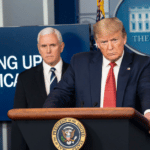





Kamala Harris, during her 2003 campaign for San Francisco district attorney, faced significant scrutiny over claims of inflating her prosecutorial experience and violating campaign finance laws.
The New York Post reported that despite the challenges, Harris emerged victorious in the election, setting the stage for her later roles as California’s attorney general, U.S. Senator, and ultimately, Vice President.
Harris’ campaign for district attorney was marked by bold claims regarding her courtroom experience.
A campaign mailer distributed to the public boasted that she had "tried hundreds of serious and violent felonies, including homicide, rape, and child sexual assault cases." However, these assertions quickly became the subject of controversy.
During a debate on KGO Radio, Harris’ rival, Bill Fazio, questioned the accuracy of her claims.
Fazio, a seasoned prosecutor, pressed Harris on how many serious felony cases she had actually tried. Harris responded that she had "tried about 50 cases," a number far less than the hundreds implied in her campaign materials.
The controversy did not end there. Terence Hallinan, the incumbent district attorney and another of Harris’ rivals, further complicated the narrative.
Hallinan revealed that Harris had worked in his office for only "a year-and-a-half" and had tried just one case during that time. Despite this, Hallinan expressed satisfaction with Harris’ work, stating that he was "sorry she left."
Adding to the challenges of her campaign, Harris was fined $34,000 by the San Francisco Ethics Commission for exceeding campaign spending limits by approximately $91,446.
The commission determined that the violation was unintentional, but the financial discrepancy was significant enough to warrant corrective action.
As part of the resolution, Harris agreed to spend money on flyers informing the public of her campaign’s violation.
The decision to rectify the situation in this manner was seen as an attempt to maintain transparency and accountability during a contentious campaign.
Throughout these controversies, Harris maintained her defense, focusing on her leadership capabilities rather than the number of cases she had personally prosecuted.
During the debate, she emphasized that "leadership…is about working with different communities," a skill she claimed to have honed as a career prosecutor.
James Singer, a spokesperson for Harris’ campaign, reinforced this narrative, stating that Harris "oversaw and was involved in the prosecution of hundreds of serious crimes before she was elected District Attorney of San Francisco."
This statement aimed to clarify Harris’ role in prosecutorial leadership, even if she had not personally tried the cases.
Despite the scrutiny, Harris won the election, defeating both Fazio and Hallinan. Her victory was a testament to her ability to navigate the complex and often contentious world of local politics, despite the hurdles she faced.
Harris’ legal career did not begin in San Francisco. Before running for district attorney, she built a reputation in Alameda County, where she worked as a deputy district attorney.
Her rise through the ranks in the legal field was driven by personal motivations, particularly the experience of a high school friend who suffered from abuse. This experience fueled her desire to protect others and pursue a career in law.
After serving as San Francisco’s district attorney, Harris’ career continued to ascend. In 2010, she was elected as California’s attorney general, where she became the first woman and the first person of color to hold the office.
Her success in this role propelled her to the U.S. Senate in 2017, and eventually, she was elected as Vice President of the United States.



